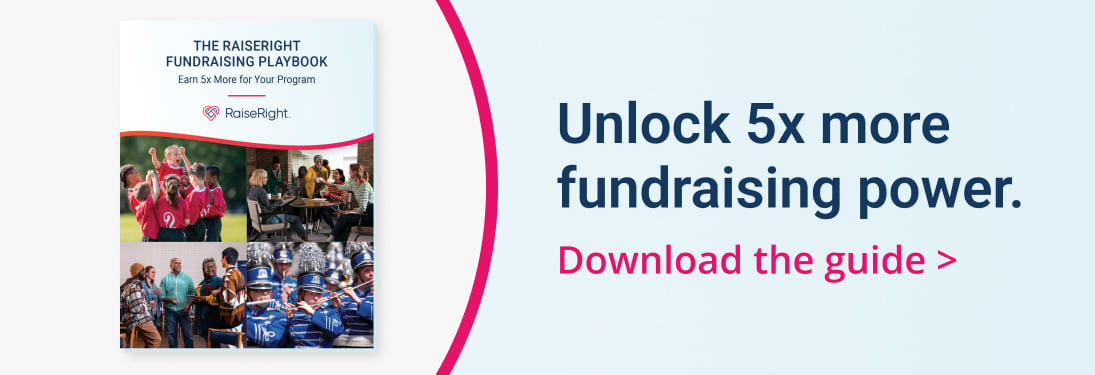Here's How to Stretch Every Dollar of Your Fundraising Event Budget

Ah, everyone’s favorite word—budget. Maybe you think of a spreadsheet with bills, expenses, and income. For others, it’s more of an abstract concept—something you know you should pay attention to but often forget or avoid.
Whether you’re a spreadsheet aficionado or a budget procrastinator, the truth remains: Having a clear and organized budget is an essential fundraising strategy, especially when planning something as important as a fundraising event.
A budget isn’t just a list of numbers—it’s your game plan. Creating a comprehensive budget allows you to estimate the total amount of money you’ll need to raise, allocate funds effectively, and ensure a successful event without overspending.
How do you get started with setting up a fundraising event budget? First, you’ll need to choose the type of event you want to have and set goals.
Choose a fundraising event
First and foremost, you should consider which type(s) of fundraising event you’re interested in. Your budget may influence the final decision, but having ideas can help you think about the potential expenses you’ll need to account for.
Popular fundraising ideas include:
- Car washes
- Golf tournaments
- Bake sales
- Read-a-thons or walk-a-thons
- Casino nights
- Benefit concerts
- Yard sales
- Movie nights
- Pancake breakfasts
Some of these—such as a concert—will incur more expenses than others. Think about how much you’re willing to spend on the event before deciding which option is right for your group.
Break down your fundraising event budget
Once you have a list of ideas, it’s time to determine your budget. Start by considering your fundraising goals: What is the purpose of your fundraiser? Is it to support a specific cause, fund a program, or reach a long-term financial milestone? Next, decide how much you need or want to raise. This target amount will guide your planning and influence the type of event you choose to host.
With your goal in mind, expand your planning to include additional resources—and expenses—required to bring your fundraising event to life, such as:
- Food and drink – Will you serve any refreshments at the event? If so, what will they consist of? Depending on your budget and estimated headcount, you can choose anything from light snacks to catered meals.
- Venue – Speaking of estimated headcount, you’ll also need to determine the number of people attending the event when choosing a venue. While some fundraisers are location-dependent (like a golf tournament), others may depend more on attendance.
- Equipment and materials – Many fundraisers require microphones, lighting, projectors, speakers, tables, and other event-specific supplies. These expenses are another crucial part of setting a budget.
- Decor – Following that, you’ll want to consider your decor options. If the event has a specific theme or you want it to coincide with your group’s branding, you may need to invest in matching decorations.
- Staff – While you can recruit volunteers for as many roles as possible, you may still need to hire outside vendors to assist. Caterers, musicians, and auctioneers are popular examples.
After all that, you should have a well-defined idea for your next fundraising event, which means it’s time to start thinking about revenue.
Determine how much you'll earn
Estimating your projected revenue is crucial to your success. In other words, you must determine how much money you realistically expect to generate from your fundraising event.
Consider the amount of money you could make from the fundraiser and determine how much you’d be willing to allocate toward your expenses. This process can help you understand whether the event will align with your financial goals.
Remember that larger events typically come with higher expenses, which can affect your earnings. On the other hand, choosing a minimal-cost fundraiser may make it easier to recoup your expenses and earn money for your cause.
Once you’ve gathered this information, organize it into a budget guide or template you create or find online. Continue reviewing and tweaking it as necessary and examine cost-cutting measures for extra savings.
Other budgeting tips for event fundraising
Now that you have an estimate of revenue and expenses, you can start thinking about ways to stretch funds even further. Here are some tips to help you spend your budget wisely without compromising quality.
Supplement your events with RaiseRight
Boost your budget with a digital fundraising platform like RaiseRight. It's one of the simplest ways to reduce expenses and raise money without spending extra money.
- Enroll your organization or group in a RaiseRight program—get started for free here.
- Add participants to your fundraiser.
- Buy gift cards or shop online with your favorite brands
like Old Navy and Lowe’s. Or, dine at participating restaurants to earn on your entire bill—tax and tip included. - Your organization earns a percentage back with every purchase—up to 20%!
It’s that simple. Plus, RaiseRight works 24/7, allowing you to raise money for your cause or offset expenses year-round.
Find free or low-cost resources
Another way to make your funds last is by using as many free and low-cost resources as possible. Try to leverage free or reduced-price options like:
- Budget templates
- Low-cost venues such as churches or parks
- Marketing templates
- Community newsletters or bulletin boards
- Social media platforms
These free or low-cost avenues can help you save money on everything from venue to marketing. Take advantage of any that will work for your fundraiser.
Secure sponsorships from local companies
Finding sponsorships is another common way to reduce expenses and free up your budget for other parts of the fundraiser. You can create tiers that allow businesses of all sizes to participate.
Sponsorships are mutually beneficial relationships. Through in-kind donations or monetary funds, companies can help support a cause that boosts their reputation and promotes their brand.
To sweeten the deal, you can also offer incentives to participating sponsors. For instance, you may offer free admission, merchandise, or food and drink tickets.
Host a virtual or hybrid fundraising event
The venue can take up a significant part of your budget, especially if you expect a large group or need a sizable room for decor and entertainment. To help reduce these costs, try:
- Virtual events – While some fundraisers, like car washes, must be in person, others can be held online. For example, hosting an online auction could eliminate venue or refreshment costs.
- Hybrid fundraisers – In some cases, opting for a smaller venue for the in-person portion of your event can save on costs while still accommodating a broad audience through online alternatives. For instance, you could cap in-person attendance to fit a more budget-friendly space while enabling others to join virtually, ensuring accessibility and inclusivity without overspending.
Reducing the costs associated with fundraising events helps you save money for necessities and ensures the experience runs smoothly.
Form partnerships
To stretch your budget, consider partnering with a second organization or business. Find groups with similar or complementary goals to yours and see if they’d like to collaborate on a fundraising event.
Co-hosting fundraisers can help both groups spend less, allowing your money to go further. In other cases, a partner organization may offer to send volunteers to your fundraiser in exchange for a return of the favor for their group.
Regardless of how you arrange the partnership, it can help you save money in your budget, allowing you to spend those dollars elsewhere.
Try DIY
Reduce the expenses for the fundraiser by doing it yourself (or with the help of volunteers).
Think about the talents and strengths you and your team members possess. Is one of you the ultimate crafter and willing to make decor? Or maybe a few people are top-rated home cooks and can provide food and refreshments.
Here are some other examples of how volunteers can use their talents to enhance your event:
- Social media promotion – If you or someone else in the group is knowledgeable about social media and understands how to create and promote events, use that to your advantage.
- Flyers and posters – Know a Canva or Adobe aficionado? Ask them to create posters, flyers, or take-home sheets so you can avoid paying extra for these services.
- Music and entertainment – Whether you know someone in a band or your partner is the best home DJ in town, allowing someone from your team to handle entertainment can help you redirect the funds elsewhere.
Asking volunteers to use their strengths to help your cause allows you to save your budget for other aspects of the fundraiser. You can also provide training and materials to people who are eager to learn. To maximize earnings, do as much creation, setup, and hosting as possible.
Make your dollars go further with RaiseRight
Whether you want to supplement successful fundraising events or reduce the planning and workload, RaiseRight can help. Our platform makes it easy to host hands-off, year-round fundraisers for churches, schools, sports teams, music programs, and other nonprofit organizations.
Use earnings to reduce your fundraising costs or continuously earn funds for your cause, even when you’re not hosting an event. Fundraising is as simple as shopping and dining at your favorite spots.
Download The RaiseRight Fundraising Playbook to learn more or get started for free today!


